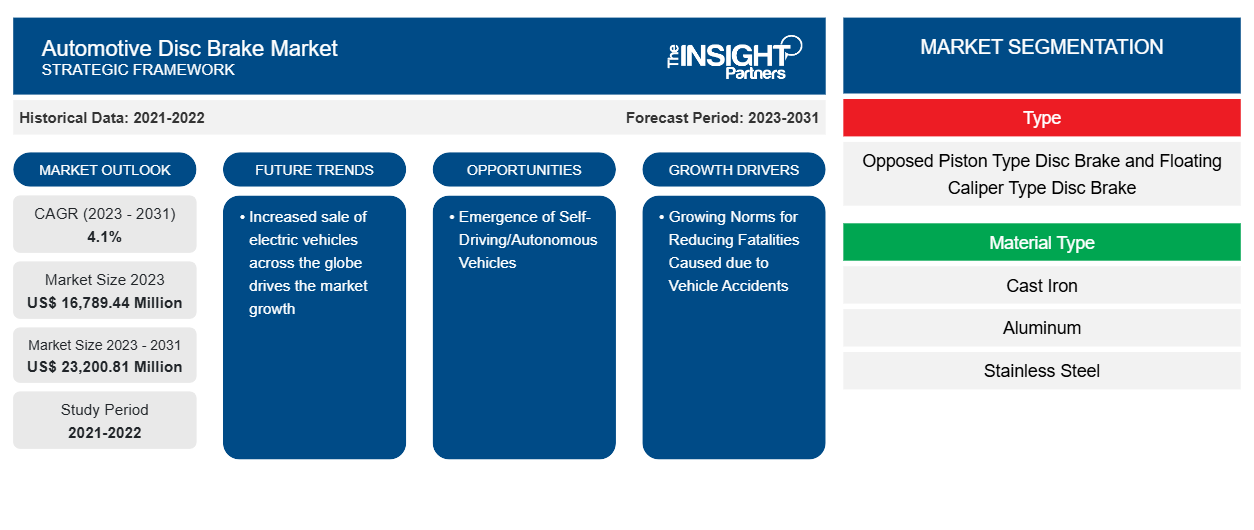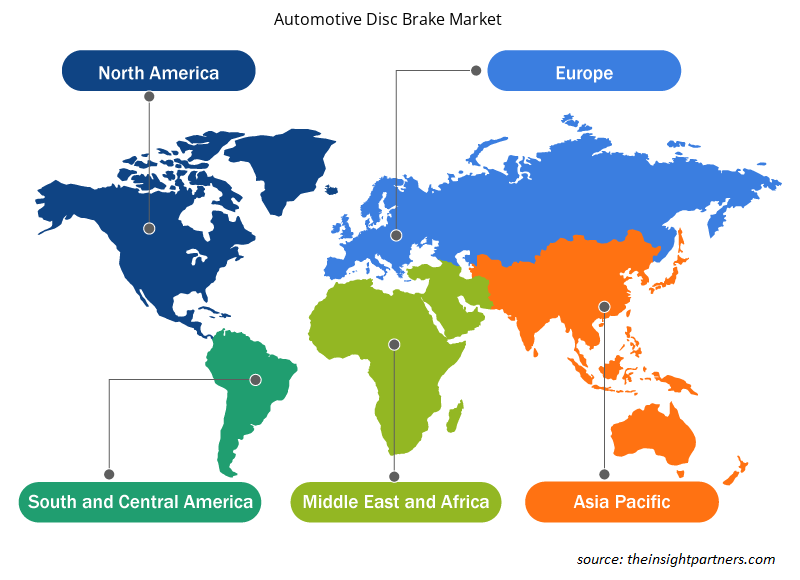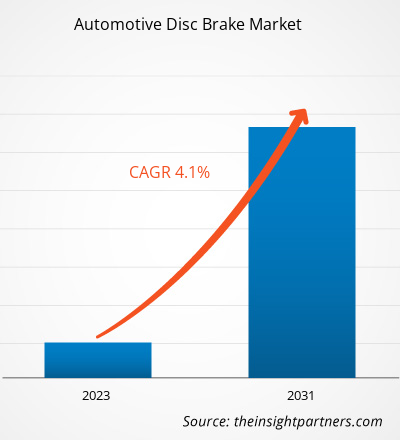The automotive disc brake market size is projected to reach US$ 23,200.81 million by 2031 from US$ 16,789.44 million in 2023. The market is expected to register a CAGR of 4.1% during 2023–2031. Increasing adoption of the self-driving autonomous vehicles across the globe are likely to remain key trends in the market. The self-driving cars are gaining traction across the developed countries such as the US, Canada, Germany, and UK. Rising penetration of the connected vehicles and adoption of the self-driving cars across the globe is key driving factor in the market.
Automotive Disc Brake Market Analysis
The key stakeholders in the global automotive disc brake market ecosystem include hardware/component providers, automotive disc brake manufacturers, standards & regulatory framing bodies, and end users. Component/hardware providers provide various components/parts/raw materials to disc brake manufacturers for manufacturing of the end-product. Brake pads, bleeder screw, calipers, rotors, and hardware. In addition to the key ecosystem players, there are several other peripheral stakeholders involved in the market which play a crucial role in enabling the growth and technology advancements related to automotive disc brake. The rising number of road accidents due to vehicle is creating need for safety regulations which is encouraging the need for for braking system rules and road safety. Some of these stakeholders include government agencies, industry associations, technology standards organizations, and regulatory bodies among many others growth of global automotive disc brake market. The major end-users of the automotive disc brake market include passenger cars and commercial vehicles
Automotive Disc Brake Market Overview
The disc brake is made up with cast iron, aluminum, stainless steel, and many more. Some of the key market players/manufacturers in the global automotive disc brake market includes Thermo Fisher Scientific Inc., Brembo S.P.A, Continental AG, Knorr-Bremse Group, and Robert Bosch GmbH among many others. Automotive disc brakes are majorly utilized in passenger cars, however, owing to their stable performance at resistance to brake and higher speeds, they are getting spread into a commercial vehicle segment. In commercial vehicles, drum brakes are getting replaced with disc brakes as they provide higher quality and longer service life. Companies such as Akebono also offers disc brakes.
Customize This Report To Suit Your Requirement
You will get customization on any report - free of charge - including parts of this report, or country-level analysis, Excel Data pack, as well as avail great offers and discounts for start-ups & universities
Automotive Disc Brake Market: Strategic Insights

- Get Top Key Market Trends of this report.This FREE sample will include data analysis, ranging from market trends to estimates and forecasts.
You will get customization on any report - free of charge - including parts of this report, or country-level analysis, Excel Data pack, as well as avail great offers and discounts for start-ups & universities
Automotive Disc Brake Market: Strategic Insights

- Get Top Key Market Trends of this report.This FREE sample will include data analysis, ranging from market trends to estimates and forecasts.
Automotive Disc Brake Market Drivers and Opportunities
Growing Norms for Reducing Fatalities Caused due to Vehicle Accidents
The rising sales of both passenger cars and commercial vehicles is fostering the brakes market growth globally. The increasing demand for vehicles is positively impacting the production cycle of the same across the globe. As the demand for vehicles is increasing, the formation of regulatory mandates for making the vehicles safer is rising. This is leading to a surge in demand for brakes. The penetration of anti-lock braking system and electronic stability control is expanding. Therefore, government bodies of countries such as India, have taken a step in regulating safety critical components within commercial vehicles and passenger vehicles, which has resulted into a rise in demand for anti-lock braking systems.
Emergence of Self-Driving/Autonomous Vehicles
Auto manufacturers and tech companies are involved in the development of sophisticated technologies that enable automobiles to drive themselves. In the race of testing self-driving vehicles, Google is leading the race, followed by Audi, Toyota, and Mercedes-Benz. Moreover, the Institute of Electrical and Electronics Engineers (IEEE) foresees that the self-driving vehicles will approximately account for up to 75% of vehicles on the road by 2040. The self-driving car industry is anticipated to benefit the development cycle of braking technologies. In addition to the rising emergence of self-driving vehicles, changing government regulations and collaborations are some of the major trends which would support transforming the automotive industry. Due to government regulations made for the safety of drivers and passengers, there are at least 47 cities globally that are piloting self-driving cars in the current scenario. With the emergence of self-driving/autonomous vehicles, the market for braking systems will continue to evolve.
Automotive Disc Brake Market Report Segmentation Analysis
Key segments that contributed to the derivation of the automotive disc brake market analysis are type, material type, and vehicle type.
- Based on type, the market is opposed piston type disc brake, and floating caliper type disc brake. Among these, floating caliper type disc brake has a largest share in 2023, owing to increased adoption in the passenger cars.
- Depending upon the material type, the market is divided into cast iron, aluminium, stainless steel, and others. Among these, aluminium is expected to have largest share in 2023, this is owing to its lightweight and higher reliability.
- Based on vehicle type, the market is divided into passenger vehicles, light commercial vehicles (LCVs), and heavy commercial vehicles (HCVs). Among these, passenger vehicles has a largest share in 2023, this is owing to increased passenger cars sale across the globe. According to the International Energy Agency, the passenger cars sale reached to 65.27 million in 2023, increased from 58.2 million units in 2022. Such, rapid growth in the sale of the passenger cars have created massive demand for the automotive disc brake market during the forecast period.
Automotive Disc Brake Market Share Analysis by Geography
The geographic scope of the automotive disc brake market report is mainly divided into five regions: North America, Asia Pacific, Europe, Middle East & Africa, and South & Central America.
Asia Pacific is expected ti have largest share in 2023, this is owing to increased automotive component production across China, India and Japan. These countries are investing ample amount in the automotive component production to meet growing demand for the new vehicles across the globe. According to the International Energy Agency, the Asia Pacific region’s automotive production reached to 51.8 million in 2023 increased by 10% year-on-year. The robust automotive production occurs in India, China and Japan. Such, growth in the automotive production in Asia Pacific region drives the automotive disc brake market growth during the forecast period.
Automotive Disc Brake Market Regional Insights
The regional trends and factors influencing the Automotive Disc Brake Market throughout the forecast period have been thoroughly explained by the analysts at The Insight Partners. This section also discusses Automotive Disc Brake Market segments and geography across North America, Europe, Asia Pacific, Middle East and Africa, and South and Central America.

- Get the Regional Specific Data for Automotive Disc Brake Market
Automotive Disc Brake Market Report Scope
| Report Attribute | Details |
|---|---|
| Market size in 2023 | US$ 16,789.44 Million |
| Market Size by 2031 | US$ 23,200.81 Million |
| Global CAGR (2023 - 2031) | 4.1% |
| Historical Data | 2021-2022 |
| Forecast period | 2023-2031 |
| Segments Covered |
By Type
|
| Regions and Countries Covered | North America
|
| Market leaders and key company profiles |
Automotive Disc Brake Market Players Density: Understanding Its Impact on Business Dynamics
The Automotive Disc Brake Market is growing rapidly, driven by increasing end-user demand due to factors such as evolving consumer preferences, technological advancements, and greater awareness of the product's benefits. As demand rises, businesses are expanding their offerings, innovating to meet consumer needs, and capitalizing on emerging trends, which further fuels market growth.
Market players density refers to the distribution of firms or companies operating within a particular market or industry. It indicates how many competitors (market players) are present in a given market space relative to its size or total market value.
Major Companies operating in the Automotive Disc Brake Market are:
- Brembo S.p.A.
- Continental AG
- Delphi Technologies (BorgWarner Inc.)
- EBC Brakes
- Haldex Group
- Hitachi Automotive Systems Americas
Disclaimer: The companies listed above are not ranked in any particular order.

- Get the Automotive Disc Brake Market top key players overview
Automotive Disc Brake Market News and Recent Developments
The automotive disc brake market is evaluated by gathering qualitative and quantitative data post primary and secondary research, which includes important corporate publications, association data, and databases. A few of the developments in the automotive disc brake market are listed below:
- ADVICS, the leader in advanced braking technology and member of the AISIN Group of companies, is expanding its brake rotor product line by adding approximately 28 million to its vehicle in operation (VIO) axle coverage. Each of the 67 brake rotors are certified high-carbon and fully coated, offering premium protection against rust and corrosion. (Source ADVICS News-letter, October 2022)
- ZF Aftermarket continues its expansion in India and the country becomes a hub for TRW's shock absorber manufacturing expertise through its manufacturing facility in the region. ZF Aftermarket made significant strides in expanding its product and solutions range for the Indian market by introducing TRW shock absorbers, brake pads, and brake discs. In line with its ‘Make in India’ for India commitment, ZF is now focused on fortifying its TRW shock absorber manufacturing capabilities in India, with a focus on cultivating a highly skilled talent pool to not only manufacture but also research, develop, and design in the country. (Source: ZF Friedrichshafen AG Newsletter, February 2024)
Automotive Disc Brake Market Report Coverage and Deliverables
The “Automotive Disc Brake Market Size and Forecast (2021–2031)” report provides a detailed analysis of the market covering below areas:
- Automotive disc brake market size and forecast at global, regional, and country levels for all the key market segments covered under the scope
- Automotive disc brake market trends as well as market dynamics such as drivers, restraints, and key opportunities
- Detailed PEST and SWOT analysis
- Automotive disc brake market analysis covering key market trends, global and regional framework, major players, regulations, and recent market developments
- Industry landscape and competition analysis covering market concentration, heat map analysis, prominent players, and recent developments for the automotive disc brake market
- Detailed company profiles
Frequently Asked Questions
Which region dominated the automotive disc brake market in 2023?
Asia Pacific is expected to dominate the automotive disc brake market in 2023.
What are the driving factors impacting the automotive disc brake market?
Growing norms for reducing fatalities caused due to vehicle accidents drives the market growth.
What are the future trends of the automotive disc brake market?
Rising penetration of the connected vehicles and adoption of the self-driving cars across the globe is key driving factor in the market.
Which are the leading players operating in the automotive disc brake market?
Thermo Fisher Scientific Inc., Brembo S.P.A, Continental AG, Knorr-Bremse Group, and Robert Bosch GmbH among many others.
What would be the estimated value of the automotive disc brake market by 2031?
The automotive disc brake market size is projected to reach US$ 23,200.81 million by 2031 from US$ 16,789.44 million in 2023.
What is the expected CAGR of the automotive disc brake market?
The market is expected to register a CAGR of 4.1% during 2023–2031.
- Historical Analysis (2 Years), Base Year, Forecast (7 Years) with CAGR
- PEST and SWOT Analysis
- Market Size Value / Volume - Global, Regional, Country
- Industry and Competitive Landscape
- Excel Dataset
- Boat Sails Market
- Heavy Commercial Vehicle Air Brake Systems Market
- Heavy Commercial Vehicle Clutch Market
- Electric Vehicle Heat Pump Systems Market
- Event Logistics Market
- Industrial Vehicles Market
- Motorsport Transmission Market
- Automotive Telematics Market
- Third Party Logistics Market
- Low Speed Electric Vehicle Market
Testimonials
Reason to Buy
- Informed Decision-Making
- Understanding Market Dynamics
- Competitive Analysis
- Identifying Emerging Markets
- Customer Insights
- Market Forecasts
- Risk Mitigation
- Boosting Operational Efficiency
- Strategic Planning
- Investment Justification
- Tracking Industry Innovations
- Aligning with Regulatory Trends
Yes! We provide a free sample of the report, which includes Report Scope (Table of Contents), report structure, and selected insights to help you assess the value of the full report. Please click on the "Download Sample" button or contact us to receive your copy.
Absolutely — analyst assistance is part of the package. You can connect with our analyst post-purchase to clarify report insights, methodology or discuss how the findings apply to your business needs.
Once your order is successfully placed, you will receive a confirmation email along with your invoice.
• For published reports: You’ll receive access to the report within 4–6 working hours via a secured email sent to your email.
• For upcoming reports: Your order will be recorded as a pre-booking. Our team will share the estimated release date and keep you informed of any updates. As soon as the report is published, it will be delivered to your registered email.
We offer customization options to align the report with your specific objectives. Whether you need deeper insights into a particular region, industry segment, competitor analysis, or data cut, our research team can tailor the report accordingly. Please share your requirements with us, and we’ll be happy to provide a customized proposal or scope.
The report is available in either PDF format or as an Excel dataset, depending on the license you choose.
The PDF version provides the full analysis and visuals in a ready-to-read format. The Excel dataset includes all underlying data tables for easy manipulation and further analysis.
Please review the license options at checkout or contact us to confirm which formats are included with your purchase.
Our payment process is fully secure and PCI-DSS compliant.
We use trusted and encrypted payment gateways to ensure that all transactions are protected with industry-standard SSL encryption. Your payment details are never stored on our servers and are handled securely by certified third-party processors.
You can make your purchase with confidence, knowing your personal and financial information is safe with us.
Yes, we do offer special pricing for bulk purchases.
If you're interested in purchasing multiple reports, we’re happy to provide a customized bundle offer or volume-based discount tailored to your needs. Please contact our sales team with the list of reports you’re considering, and we’ll share a personalized quote.
Yes, absolutely.
Our team is available to help you make an informed decision. Whether you have questions about the report’s scope, methodology, customization options, or which license suits you best, we’re here to assist. Please reach out to us at sales@theinsightpartners.com, and one of our representatives will get in touch promptly.
Yes, a billing invoice will be automatically generated and sent to your registered email upon successful completion of your purchase.
If you need the invoice in a specific format or require additional details (such as company name, GST, or VAT information), feel free to contact us, and we’ll be happy to assist.
Yes, certainly.
If you encounter any difficulties accessing or receiving your report, our support team is ready to assist you. Simply reach out to us via email or live chat with your order information, and we’ll ensure the issue is resolved quickly so you can access your report without interruption.





















 Get Free Sample For
Get Free Sample For